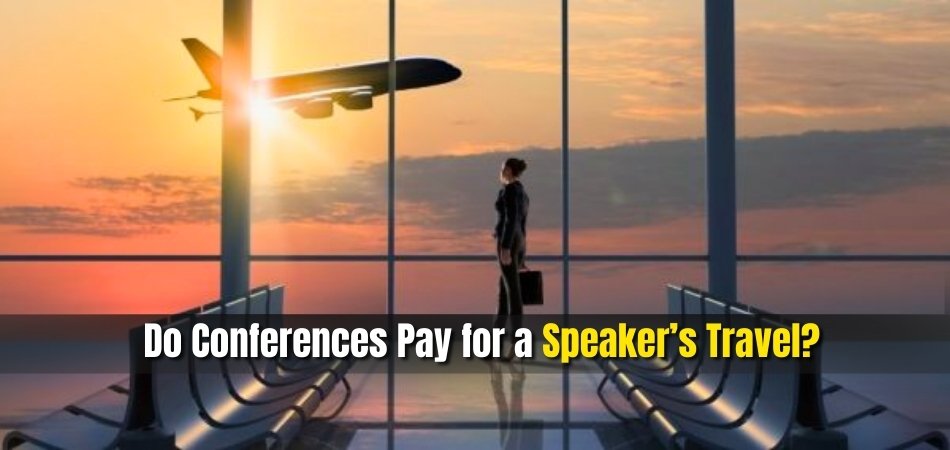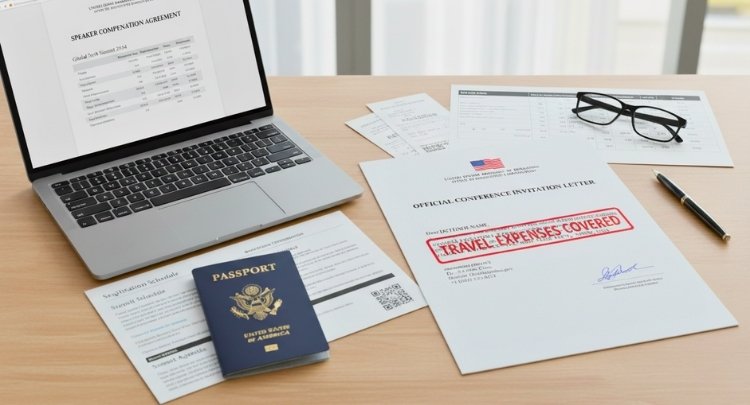You get an email invitation to speak at a conference. The topic fits you well. The event sounds good. But one question quietly sits in your mind before you reply.
Who pays for the travel?
Flights are expensive. Hotels add up fast. Some speakers get everything covered, while others pay from their own pocket. Many people accept invitations first and ask later, only to feel confused or uncomfortable when costs come up.
So, do conferences pay for a speaker’s travel?
Sometimes yes. Sometimes no. And sometimes only part of it.
Large business and tech conferences often pay for keynote speakers. Smaller events may only offer free entry. Academic conferences often expect speakers to arrange their own travel, with help from universities or grants. The answer depends on your role, the event budget, and where you are traveling from.
This guide breaks it all down in a simple way. You will learn who usually gets travel covered, what costs are paid, how the payment process works, and how to ask the right questions before you say yes. By the end, you will know exactly what to expect and how to avoid surprise expenses.
Do Conferences Pay for a Speaker’s Travel?
Conferences invite speakers for many reasons, and travel rules differ widely. Some events cover all costs, while others cover little or nothing. Speaker role, budget, and location all affect these decisions. Read below to understand how travel support usually works.
Conference Type And Industry
Different industries handle speaker travel in different ways. Tech and business events often plan travel support early. Education or nonprofit events may have tighter limits. Larger conferences usually plan travel costs into ticket pricing. Smaller meetups may focus funds on the venue and basic logistics.
Speaker Role: Keynote Vs Panelist Vs Guest Speaker
A speaker’s role matters a lot when travel is discussed. Keynote speakers often receive full travel and hotel support. Panelists usually get free passes or partial coverage. Guest speakers may receive help only if budgets allow. Clear expectations are often shared before any agreement is final.
Conference Budget And Sponsorship Level
Budget size shapes what organizers can offer speakers. Events with strong sponsors often cover flights and hotels. Smaller budgets may only cover registration or local transport. Sponsors sometimes request specific speakers, which can unlock extra funds. Budget limits are usually practical, not personal decisions.
Domestic Vs International Speaker Location
Distance plays a major role in travel support decisions. Local speakers are cheaper to host and easier to manage. International speakers cost more due to flights and visas. Some events still invite them for value and reach. Others choose virtual talks to avoid high travel costs.
Full Coverage: When Everything Is Paid
Some conferences offer full coverage for select speakers. This usually includes flights, hotel stays, meals, and entry passes. Well known speakers often receive these offers. Organizers see this as an investment in attendance and trust. Clear agreements help avoid confusion later.
Partial Coverage: Shared Travel Responsibility
Partial support is very common across many events. Speakers may receive hotel rooms but book flights themselves. Sometimes travel is reimbursed after the event ends. This option balances costs for organizers and speakers. It also allows events to invite more voices within limited budgets.
Self Funded And Academic Speakers
Many academic or early career speakers pay their own way. Universities or employers may help with costs instead. Conferences still offer learning and connection value in return. This model is common in research focused events. It works best when expectations are clear from the start.
What If the Conference Cannot Pay for Travel?
Common alternatives include:
- University or employer travel funds
- Research grants and bursaries
- Conference-specific travel grants
- Professional association funding
Many academic and international events offer travel grants to support speakers with limited funding. These programs are common across education and research sectors and are supported by institutions and global organizations.
Company Funded Speaking Engagements
When speakers represent a company, travel is usually covered by employers. Speaking supports brand goals, so costs are planned internally. Conferences often provide free passes in these cases. This setup benefits both sides. It also explains why company speakers rarely ask organizers for travel funds.
Speaker travel rules depend heavily on the type of conference.
Academic Conferences
- Travel is rarely paid for regular speakers
- Keynote speakers may receive full or partial support
- Many speakers rely on university funding or travel grants
- Reimbursement limits are usually strict
Corporate and Business Conferences
- Keynote speakers often receive full travel coverage
- Guest speakers may receive flights, hotels, and honorariums
- Panel speakers usually receive partial support or free entry
- Budgets are higher due to sponsorship and ticket sales
Knowing which type of event you are dealing with helps set realistic expectations before accepting an invitation.
Travel support depends on clear factors, not random organizer choices. Knowing your role helps you plan better conversations early. This matters especially for upcoming conferences, where budgets are still flexible. Asking early and politely keeps expectations realistic for everyone involved.
What Costs Do Conferences Pay for a Speaker’s Travel?
Conferences often help speakers with travel costs, but rules differ by role. Some speakers get full support, while others get limited help. Knowing what is usually covered helps speakers plan clearly and avoid surprise costs before events start.
- Airfare Coverage: Most conferences pay for economy flights or trains, either by booking tickets directly or repaying costs later, with clear limits on price and required proof.
- Ground Transport: Local travel like taxis, rideshares, buses, or mileage is often covered, but rental cars usually need approval before booking and must follow set price rules.
- Hotel Stays: Rooms are usually booked at the event hotel for nights linked to speaking days, with limits on extra nights, room upgrades, and personal charges.
- Meals and Per Diem: Food costs are covered through provided meals or a daily allowance, which has a fixed amount and needs receipts if rules require them.
- Speaker Type Matters: Keynote and invited speakers often receive full travel support, while regular session speakers may only get free registration and limited travel help.
- Spending Limits: Clear caps are set on each cost type, and spending above those limits is usually paid by the speaker unless written approval is given early.
- Receipts and Rules: Proof of payment is often required for repayment, and missing receipts or late requests can lead to rejected claims and unpaid costs.
Always read the speaker agreement carefully before booking travel. Ask questions early. Clear planning helps avoid money issues and keeps both the event and the speaker prepared throughout the conference.
How Much Do Conferences Usually Pay for Speaker Travel?
Conference travel pay depends on event size, goals, and overall budget. Some events cover everything, while others pay only basic costs. Knowing normal amounts helps speakers plan trips without money stress. Read below to see clear amounts explained in short sections.
Domestic Airfare Reimbursement
Most local conferences refund economy flights within a fixed spending cap. Typical repayment sits between 300 and 700 dollars. Early booking is often required to control prices. Added seat or bag fees may be excluded. Payment usually comes after the event ends. Always confirm limits before booking tickets.
International Airfare Reimbursement
For overseas trips, conferences set higher limits for travel support. Reimbursement commonly ranges from 600 to 1,200 dollars. Flights are almost always economy class. Travel budgets can vary wildly, but the largest expenses are often reserved for high-profile speakers whose fees and lodging requirements are substantial. Preapproval is usually required before purchase.
Hotel Stay Coverage
Event organizers often cover hotel rooms near the venue. Nightly rates usually fall between 100 and 300 dollars. Standard rooms are the norm. Extra nights may not qualify for payment. Taxes are sometimes included. Room upgrades or companions are typically paid by speakers. Always check the booking method beforehand.
Meals And Local Transport Allowance
Daily food and local transport are sometimes paid as allowance. Amounts often range from 50 to 100 dollars. This covers meals, taxis, and short rides. Luxury dining is rarely approved. Receipts may still be requested. Clear rules help avoid confusion during reimbursement. Alcohol costs are commonly excluded from claims.
Speaker Honorarium Or Talk Fee
Beyond travel, some events pay speakers for their time. Guest talks often earn between 500 and 2,000 dollars. Panels usually pay less. Fees depend on topic, length, and event size. Smaller conferences may offer none. Payment timing should be agreed in writing. This practice is common at business focused conferences.
Honorarium vs Travel Reimbursement: Know the Difference
An honorarium is payment for your time and expertise. Travel reimbursement only covers costs you already paid.
Some conferences offer:
- Travel coverage but no speaking fee
- A speaking fee but no travel support
- Both, for keynote or invited speakers
Always confirm whether payments are fees or reimbursements, as they are handled differently for budgeting and tax purposes.
Travel pay rules differ, but clear agreements prevent later problems. Always request written details before confirming any speaking role there. Use these ranges to compare offers and plan budgets wisely. Smart planning helps speakers avoid stress and focus on delivery.
How Speaker Travel Funding Works at Conferences?
Speaker travel funding is the system conferences use to help speakers pay for travel costs. This usually includes flights, hotel stays, and local transport. Some conferences pay these costs in advance, while others reimburse the speaker after the event. The exact rules depend on the conference, so speakers and organizers normally agree on the details before the event.
1. Organizers Agree with You First
Before anything, the conference organizer and the speaker agree in writing what travel costs will be covered. This can be part of your invitation letter or speaker contract. You should always ask before booking anything.
2. You Pay First or the Conference Pays Directly
Here are the two common ways travel costs are handled:
- Reimbursement after you pay:
You buy your plane/train ticket, book your hotel, and save the receipts. After the conference, you send all receipts to the organizer and they pay you back. - Conference pays ahead of time:
Sometimes the event books the flight and hotel for you directly without you paying first. This is often easier if you can’t afford to pay up front.
3. What Travel Costs Are Usually Covered
Most conference travel funding includes these items:
- Flight or train tickets to and from the event location
- Hotel for the nights you need to be there
- Local transport such as taxi, bus, or train to and from the airport
- Visa costs for international travel, if needed
- Sometimes daily food allowance or per-diem is included
4. Economy or Standard Costs Only
Organizers usually cover standard costs like economy airfare and normal hotel rooms. If you choose a more expensive option, that extra money is on you unless they agreed otherwise.
5. Most Organizers Require Proof
If you pay for travel yourself, you must send receipts and sometimes boarding passes to get reimbursed. If a receipt is missing, some conferences will not pay that part.
6. Extra Support Options
Some conferences also offer travel grants or scholarships that fund travel for people who might not have other support. These are usually based on need or contribution to the event.
In short
- You and the organizer agree on travel funding first.
- Either the conference pays upfront or reimburses you after.
- They cover normal costs like flight, hotel, and transport.
- You must save receipts and submit them for reimbursement.
Do Virtual or Hybrid Conferences Pay Speakers?
Yes, virtual or hybrid conferences often pay speakers, but the support looks different from in-person events. Since there is no travel involved, conferences usually redirect those savings in other useful ways. Below are the most common options speakers receive today.
Speaker Honorariums
Many conferences offer a fixed honorarium instead of paying for flights or hotels. This is a simple payment for time, preparation, and expertise. It is common for keynote speakers and expert-led sessions, especially in virtual formats.
Technical Stipends
Some events provide a small stipend to cover equipment needs. This may include microphones, webcams, lighting, or internet upgrades. The goal is to ensure good audio and video quality for online audiences.
Free Event Access And Recordings
Speakers are often given free access to paid sessions, workshops, or full conference recordings. This adds value, especially when the event includes premium content or long-term learning materials.
One-Time Speaking Fees
For expert or specialized sessions, conferences may offer a clear one-time speaking fee. This is more common for panels, workshops, or training-style talks where practical skills are shared.
After 2020, many conferences changed how they support speakers. Travel savings are now often used for direct speaker payments. This approach is still widely used in 2025 and 2026, especially for international and virtual speakers.
How to Ask a Conference to Pay for Speaker’s Travel?
It is normal to ask a conference to pay for your travel if you are invited as a speaker. Many events already plan for this. The key is to ask politely and clearly. Here is how you can do it:
- Say thank you for the invitation first
- Show interest in the event
- Ask about travel support in a calm and respectful way
- Be clear about what you need, such as flight, hotel, or local transport
You do not need to sound demanding. A simple question is enough. Example lines you can use in a message:
- “I wanted to ask if the event provides travel support for speakers.”
- “Could you please let me know if travel and accommodation are covered?”
What to Ask Before Accepting a Speaking Invitation
Before you say yes, it is smart to confirm a few important things. This helps avoid confusion later.
Travel and Stay
- Will the conference pay for flights or train tickets?
- Is hotel accommodation included?
- How many nights are covered?
Local Costs
- Is airport pickup provided?
- Will local transport be reimbursed?
- Are meals included during the event days?
Payments and Process
- Do they book travel, or do you book and get refunded?
- What is the budget limit for travel?
- When will the reimbursement be done?
Event Details
- Exact date and time of your talk
- Length of the session
- Topic and audience type
Asking these questions early shows that you are professional and organized.
Sample Email to Request Speaker Travel Funding
You can copy and edit the email below based on your situation.
Subject: Question About Speaker Travel Support
Hello [Name],
Thank you very much for inviting me to speak at [Conference Name]. I am happy to be considered and the event sounds interesting.
Before confirming my participation, I wanted to ask about travel support for speakers. Could you please let me know if the conference covers travel and accommodation costs?
If possible, I would also like to know how the booking or reimbursement process works.
Thank you again for the invitation. I look forward to your reply.
Best regards,
[Your Name]
Final Tip
Always ask about travel support before you confirm. It saves time and avoids awkward talks later. Most conferences expect this question, so do not feel shy about asking.
How to Negotiate Speaker Travel Support Politely?
Negotiation does not mean demanding. It means asking clearly and early.
Helpful tips:
- Ask before confirming your participation
- Keep the request short and respectful
- Focus on logistics, not entitlement
- Mention flexibility if full coverage is not possible
Example negotiation lines:
- “I wanted to check what travel support is available for invited speakers.”
- “If full travel is not possible, is partial coverage or reimbursement an option?”
- “Would virtual participation be acceptable if travel funding is limited?”
Polite and early questions protect relationships and avoid awkward discussions later.
Signs to Be Aware of When Making a Payment or Accepting an Offer for a Speaker
Here are some clear and practical warning signs to keep in mind when dealing with conferences and speakers. These points help both speakers and organizers avoid wasted time, money, and effort.
When Speakers Should Not Pay to Speak
Before agreeing to speak at any event, it is important to check if the conference is real and worth your time. Some events care more about fees than quality talks.
- The conference asks for high fees just to give a talk
- You are asked to pay before any clear schedule or details are shared
- The invitation email sounds copied and overly praising without knowing your work
- The organizer pushes for fast payment and avoids questions
- The event accepts your talk very quickly without review
- The website looks messy, unclear, or full of errors
- Speaker names listed are hard to find online
- Sponsors listed cannot be confirmed on their own sites
- The topic list is too wide and unfocused
- Venue, date, or location details keep changing or are unclear
Warning Signs Organizers Should Watch for in Speakers
Organizers also need to be careful. Accepting fake or unqualified speakers can hurt the event’s reputation and value.
- The speaker’s background cannot be verified online
- Their job title or institution does not seem real
- The topic does not match the event theme
- They use only free email addresses with no work link
- They make big claims about awards with no proof
- Applications are rushed and lack clear details
- Affiliations listed have no online presence
- They ask for unusual payments or conditions
- There is no record of past talks or publications
- They claim expertise in many unrelated subjects
Simple Thing to Remember
If money matters more than meaning, it is usually a bad sign. Good conferences and real speakers focus on quality, clarity, and trust before anything else.
What Conferences Expect When They Pay for a Speaker’s Travel?
When conferences cover speaker travel, clear rules help everyone plan smoothly. These rules avoid confusion, save time, and protect both sides. Speakers need to know costs, steps, and limits before booking. Read below to understand expectations and handle travel the right way.
Clear Agreement Up Front
Before accepting, organizers share written details about covered travel costs. This may include flights, hotels, meals, or local transport. Knowing limits early prevents surprise bills later. Always confirm what needs approval before booking, so plans match the agreement and budgets stay safe for both sides, for everyone involved.
Reimbursements With Receipts
Many events repay costs only after receiving original receipts. Keep copies of tickets, hotel bills, and meal slips. Organizers often require a form with dates and amounts. Submitting complete records speeds payment and avoids follow up emails that delay refunds for weeks after the event ends properly.
Reasonable And Approved Expenses
Conferences usually pay for standard options, not luxury choices. Expect economy flights, regular trains, and simple rooms. If you choose upgrades, you may cover extra costs yourself. Sticking to agreed options keeps spending fair and avoids awkward talks later. This helps planners manage budgets calmly each time.
Deadlines And Reimbursement Rules
Most conferences set deadlines for sending forms and receipts. Missing these dates can stop payments completely. These rules help teams close accounts quickly. Mark deadlines early, submit fast, and confirm receipt so money returns without stress or confusion after busy event schedules end for all staff involved.
Travel Must Match Approved Plans
If plans change, approval is often required first. Extra nights or different flights may not be covered. Organizers budget based on agreed dates and routes. Clear updates protect trust and prevent disputes after the event ends. Always ask before changing bookings to stay aligned with written terms.
Attendance And Professional Conduct
When travel is paid, attendance is expected. Speakers should arrive on time and deliver sessions fully. Good communication matters if problems appear. When planning budgets, most event organizers prioritize securing good keynote speakers because their presence drives attendance and perceived value. This trust depends on reliability and respect.
Clear travel rules protect budgets and support smooth conference planning. Speakers benefit when expectations are shared early and followed closely. Simple steps like receipts and deadlines prevent stress later for everyone. With clear communication, both sides focus on delivering a strong event.
Are Speaker Travel Expenses Tax Deductible?
If a conference does not cover your travel, the costs may still be deductible. In many countries:
- Travel expenses for professional speaking can qualify as business expenses
- Flights, hotels, meals, and transport may be deductible
- Receipts and proof of purpose are required
Tax rules vary by country, so speakers should confirm details with a local tax professional. This is one reason conferences often request receipts even when travel is reimbursed.
FAQs About Do Conferences Pay for a Speaker’s Travel?
Here are some common questions people still have about speaker travel at conferences. These answers clear small doubts that often come up later. Each one explains the idea simply, so planning and decisions feel easier and more confident.
Can A Speaker Ask For Travel Support If It Is Not Mentioned?
Yes, a speaker can still ask politely if travel support is not listed. Some conferences decide support only after knowing speaker needs. Asking early shows clear planning. It also helps organizers respond honestly.
Do Virtual Speakers Ever Receive Travel Related Benefits?
Virtual speakers usually do not get travel support. They do not need flights or hotels. Some events still offer small talk fees or gifts. This depends on event policy.
Is Travel Insurance Covered By Conferences?
Most conferences do not pay for travel insurance. Speakers usually arrange and pay for it themselves. Some organizations may include it for invited speakers. This should always be confirmed early.
Are Visa Fees Ever Paid For Speakers?
Some conferences help with visa fees for invited speakers. This is more common for international events. Not all events can afford this support. Written approval is usually required.
Can A Speaker Bring A Guest On Covered Travel?
Guest travel is usually not covered by conferences. Hotel rooms are meant for speakers only. Any extra cost is paid by the speaker. Always check before assuming shared stays.
Do Conferences Pay For Travel If A Speaker Cancels?
In most cases, canceled talks lose travel support. Some events may pay non refundable costs. This depends on the contract terms. Clear notice helps reduce losses.
End Note
Speaker travel support varies across events, budgets, and roles, so clarity matters early. Understanding common practices helps speakers plan costs, ask smart questions, and avoid stress while focusing energy on delivering talks that benefit both audiences and organizers.
So, do conferences pay for a speaker’s travel? The short answer is sometimes yes. Payments depend on speaker role, event size, and funding, with keynotes often covered fully while others receive partial or no support available.
Before accepting any invitation, confirm travel rules, limits, and deadlines in writing. Keep receipts, follow agreements, and communicate early if plans change. These steps protect your time and money. Wishing you talks, fair support, and conference experiences ahead.









